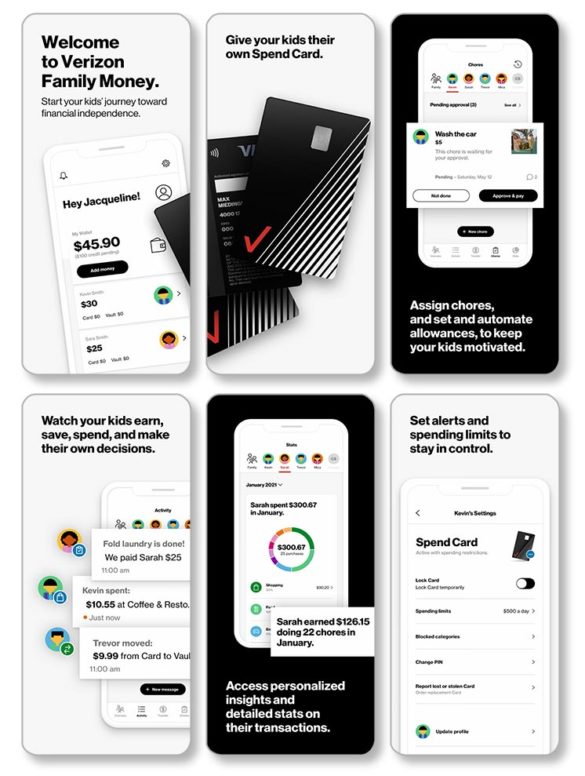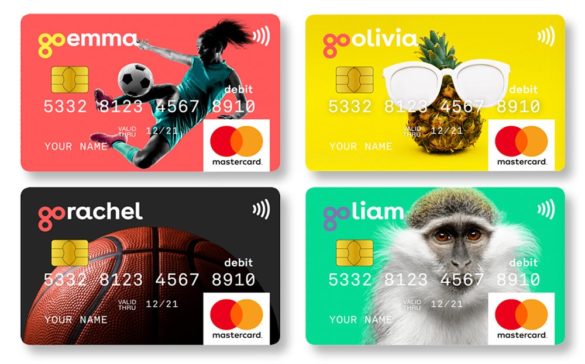Mobile network powerhouse Verizon is following in the footsteps of challenger neobanks. It’s breaking further into the financial industry by offering mobile banking options to teenagers.
The new tool, which the company named “Family Money,” offers two options — “monitorable” checking, so parents can observe and keep track of what their children are paying for, and a “savings vault” account.
“It’s the perfect way to help kids learn the ins and outs of managing money and yet another way we’re providing real benefits to our customers,” Todd Oberstein, Executive Director Product Management and Development at Verizon, said in a statement.
What’s interesting is Verizon’s Family Money program is not just a bank account. To cater to the challenges of parenting, the New York City-based communications company is integrating various services to help parents develop good spending habits for their children. The company is targeting kids between the ages of 8 and 17.
For instance, with a Family Money account, parents can set up a chore list on Verizon’s mobile app or website and, when a child completes their chore, money can be instantly and automatically transferred from the parent’s “Wallet.”

Send the Right Offers to the Right Consumers
Achieve a better return on your marketing investment. Leverage behavioral data and analytics to target the right customers with the best possible offers.
Read More about Send the Right Offers to the Right Consumers

Industry Cloud for Banking from PwC
PwC’s Industry Cloud for Banking applies our deep industry knowledge to your specific business needs
Both parents and kids can also set up real-time alerts to track purchases, set up rules and spending limits and lock cards.
“With Family Money, we’re showing what’s possible when tech and financial services come together,” Oberstein said. “Building on the success of products like the Verizon Visa Credit Card and the tools we already have for families as they grow with us, Family Money provides even more value to our customers based on their unique needs.”
Verizon tapped payment processing platform Galileo for the company’s API and will offer the bank accounts and a prepaid Visa card called the Spend Card through Metropolitan Commercial Bank. Metropolitan, which calls itself “The Entrepreneurial Bank,” is known for supporting fintech and neobank programs including Revolut and MoneyGram.
Underlying Question:
What are the implications of a deep-pocketed company with national brand recognition swooping in to steal the attention and loyalty of younger generations, even before they enter high-school?
While the service may transform the lives of parents getting their kids ready for the real world, it’s only free for the first 30 days — including for Verizon customers. After the initial month, there is a $5.99 subscription fee. Even for those that have a Verizon phone bill, subscription charges are paid through the parent’s “Wallet” on the Verizon mobile app.
Verizon Isn’t Alone In Aiming Young
No one can argue that Verizon’s new program isn’t innovative, especially for a mobile phone network provider. However, the company is not the only one offering specialized bank accounts to the younger generations.
Revolut
London-based neobank Revolut is already a competitor in the adolescent banking space. While the neobank is fairly new (established in 2015), Revolut has built up a large portfolio of customers, comprised of both individuals and businesses. However, the company also offers a banking account to teenagers, Revolut Junior, with an emphasis on responsible spending and budgeting tips.
Because of its focus on financial education, Revolut’s Junior account takes kid banking to the next level. The neobank advertises that it has “famous money tools” to help make learning about budgeting fun for teenagers.
Learn More:
- How Revolut’s ‘Super App’ Strategy Could Shake Up U.S. Banking
- The Increased Threat of Google ‘Plex’ Accounts (And How to Compete)

GoHenry
Little known so far in the U.S., GoHenry, has been swimming in the banking industry since 2007 and has more than 1.5 million users. Its goal is very simple and shares key characteristics with Verizon’s new program.
Kids ranging in age from 6 to 18 can get a bank account, customize the look of their card and earn money from chores. Parents can also monitor their children’s spending and set spending limits.
T-Mobile
Lastly, Verizon’s direct competitor, T-Mobile, has its own checking account — coined T-Mobile Money — which the company launched in 2015, with BankMobile.
The style of the checking account holds true to the T-Mobile way: no monthly fees, no minimum balance fees, no overdraft fees, no transfer fees and no late payment fees. And even though it is designed as a completely mobile option, T-Mobile banking customers still can gain access to over 50,000 fee-free ATMs.










